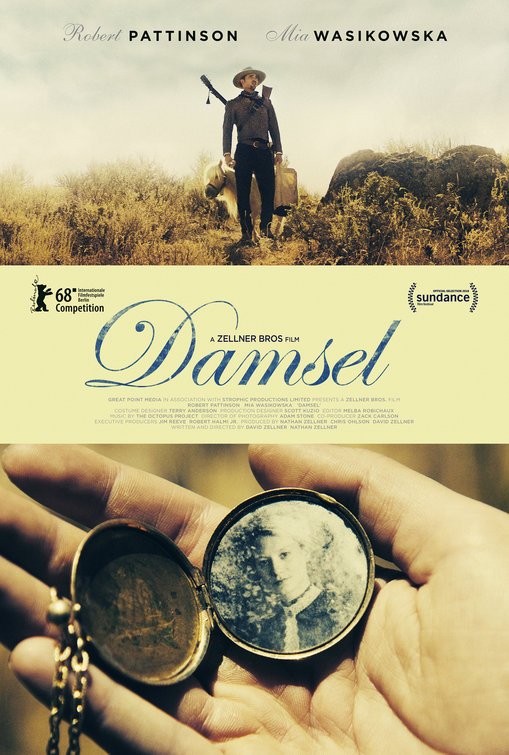"Abhorrent Nihilistic Fable"

| None | Light | Moderate | Heavy | |
|---|---|---|---|---|
| Language | ||||
| Violence | ||||
| Sex | ||||
| Nudity |
What You Need To Know:
DAMSEL is painfully slow. Though it’s labeled a comedy, it’s more ridiculous and dumb than humorous. The writing is poor and stilted. Opportunities for well-crafted dialogue are substituted with vulgar imagery and language, along with anachronisms. Finally, DAMSEL has an abhorrent humanist, nihilistic worldview that makes light of Christianity, life, death, love, marriage, and meaning.
Content:
More Detail:
Set in the Wild West sometime in the 1800s, DAMSEL centers on Samuel Alabaster (Robert Pattinson) and his quest to marry the love of his life, Penelope (Mia Wasikowska). On his journey to Penelope, he picks up an assortment of items for the proposal and marriage, including a dwarfed pony, a ring and a pastor, Parson Henry (David Zellner). With his possessions in tow, Samuel and Henry meet an assortment of characters common to classic Western movies. As time passes, the audience’s expectations are challenged as viewers begin to realize the characters and situations aren’t all they seem to be, which leads to a surprising turn of events.
Western movies are commonly known for their battles between good and evil, man’s triumph in a wild and uncivilized world, the classic Western archetypes and culture types of Indians, damsels, gruff and hardy cowboys, vigilantes, and the archetypal hero. DAMSEL, though a western aesthetically and structurally, defies every single one of those elements. The woman isn’t helpless and, in fact, may be the strongest character in the entire movie. The hero isn’t all he seems to be. The parson isn’t a bulwark of the faith. The Indians aren’t savages but protectors of maidenhood. Finally, in the end, does good really conquer evil? Is there really such a thing as evil, or are people merely misguided? Is there true and undying love or is love something everyone wants but no one can actually achieve? What is life’s purpose if good and evil, love and villainy, don’t actually exist? What does one fight for? What does one live for?
Though the advertisements for DAMSEL hinge on Pattinson and Wasikowska, the first and last person the audience sees is Parson Henry. All Henry wants is a new beginning after the loss of his wife and child during childbirth. He believes going west will grant this clean start. In the movie’s opening conversation, a man turns to him and says that where you’re coming from and where you’re going are the same, equally hard, rotten, and weird. So, don’t look for your salvation anywhere.
Parson Henry becomes a drunk and gets roped into Samuel’s quest for love, during which he has his values challenged and nerves shaken. Henry makes a go at a happy ending but ends up in the same exact place he was in the beginning: at a bar in a deserted town, where all the other hopeless men and women reside as they live out their miserable existence. The faith Henry proclaims to serve (Christianity) and convictions he has are changed, depending on his circumstances, and the Bible he carries is more for image than anything else. Using the pages as toilet paper, tissues or kindling, the movie suggests the only thing the Bible is good for is basic human functions in the material world. There is no larger purpose. Though evident in other areas of DAMSEL, the movie’s humanist worldview can be determined most clearly by the character of Parson Henry. Does he find salvation?
DAMSEL answers this question by arguing that there is no salvation. At its core, this movie is an existential comedy, pointing out the fleeting aspects of human life and the wild world in which man lives. By destroying classic western tropes, the movie argues life isn’t as cut and dry as man likes to make it, but rather is a farce. Life is meaningless. When a character dies there is no mourning, there is no emotional connection to them, and it happens without any drama or even purpose. By choosing a pastor to be the center of the story and by portraying his faith as meaningless, the writers are saying that even this “human conception” of God is worth nothing, because there’s nothing outside of this world, and certainly no morals or standards.
Casting Pattinson and Wasikowksa, actors known for playing serious and romantic roles, likewise serves the movie’s humanist, nihilistic themes. They aren’t playing serious or romantic roles in DAMSEL at all. Nothing is as it seems, and the characters in the movie, as well as the audience, have to accept that and move on.
In one respect, DAMSEL captures some of the beauty of the Old Testament Book of Ecclesiastes. Thus, the movie concludes that life is futile, man is vain, and there’s nothing new under the sun. That said, the movie fails to take this one step further, as Ecclesiastes does. Though Ecclesiastes argues that this life is fleeting and hard, “the end of the matter” (in other words, life’s purpose) is to “fear God and keep his commandments, for this is the whole duty of man” (Eccles. 12:13).
DAMSEL is painfully slow. Though labeled as a comedy, it’s more ridiculous and dumb than humorous. The writing is poor and stilted, substituting opportunities for well-crafted dialogue with vulgar imagery and language, and sprinkling in some anachronisms throughout its story. Scene transitions are roughly cut and reminiscent of a high school movie project. Pattinson and Wasikowska do the best work they can with the material and direction provided to them, but the movie fails to deliver anything substantial, which, since the movie’s rather nihilistic, may be the point. MOVIEGUIDE® advises extreme caution for all viewers due to the movie’s abhorrent, unacceptable nihilistic, humanist, anti-biblical worldview, which makes light of Christianity, life, death, love, marriage, meaning, and life’s purpose.



 - Content:
- Content: 